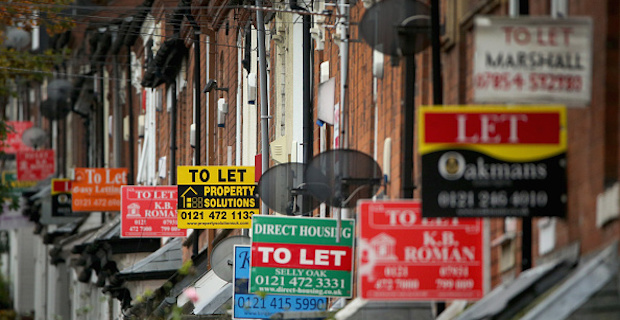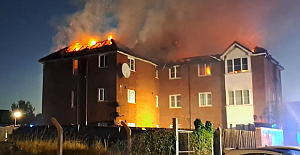Renters aged over 30 are more likely to move to cheaper areas as the cost of renting has soared and availability squeezed, Dataloft figures also show. The consultancy said trade-offs were needed so people could stay in budget. The National Housing Federation suggested more older people faced insecure, expensive tenancies. The body, which represents housing associations, said older people's health and wellbeing were suffering, and called for an increase in social housing.
Downsizing trend
Rents have been rising at a rapid rate, increasing at more than 10% in a year for new tenancies in some areas. Demand is high and the number of available homes has dropped as some landlords sell up. As well as young, single people finding it hard to start out, families and older tenants have been affected. Dataloft estimates, analysed by the BBC, suggest almost half of new tenancies taken on by families earning £30,000 to £70,000 in the first six months of this year were for one or two-bed homes.
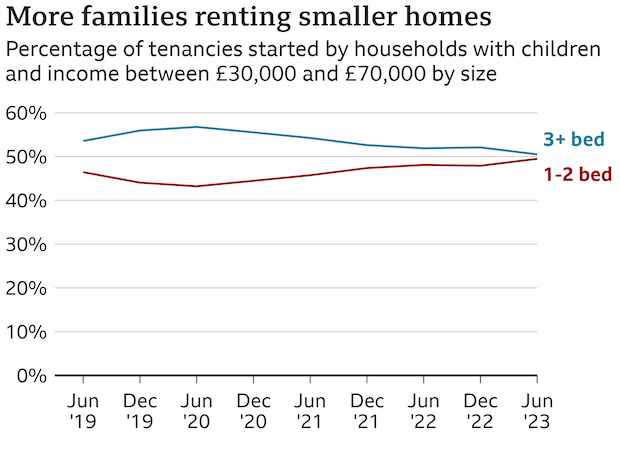
In the first half of 2020, during the period covered by the first national lockdown, 57% of new tenancies signed by families on £30,000 to £70,000 a year were for homes with at least three bedrooms, according to Dataloft. In the same period of 2023, that figure had fallen to less than 51%. That means thousands more families a year taking on smaller properties than in 2020. Sandra Jones, managing director of Dataloft, said: "We believe these reductions in renters' standard of living to be the direct result of the severe supply constraint that has driven up rents. "When affordability is stretched, as it is for so many today, people make trade-offs in order to stay within a budget."
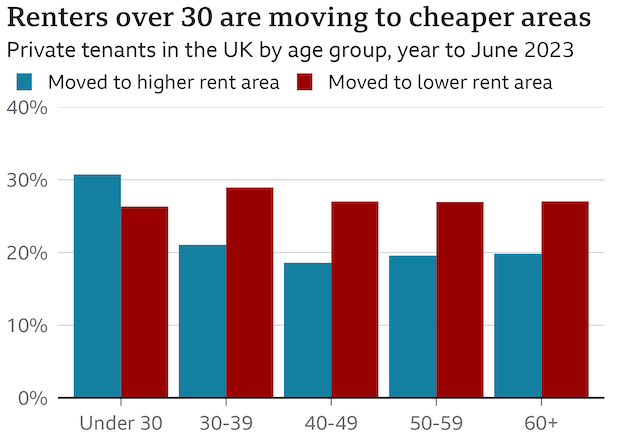
The data also showed renters over 30 years old were more likely to move to a cheaper area than a higher value one when they changed home. About a fifth of people aged 30 to 39 would move to a higher priced area while more than a quarter would move somewhere cheaper. Among the under 30s, it was the other way around with just under a third moving to a higher rent location in the previous 12 months. Property portal Zoopla said a lack of availability of private rented homes was adding to the trend of families taking on smaller properties. Executive director Richard Donnell said the slower buying and selling market meant greater demand in lettings, so people "can only find or rent what is available". According to the 2021 census, four in 10 people who rent through a private landlord or agency are in two-bedroom homes.
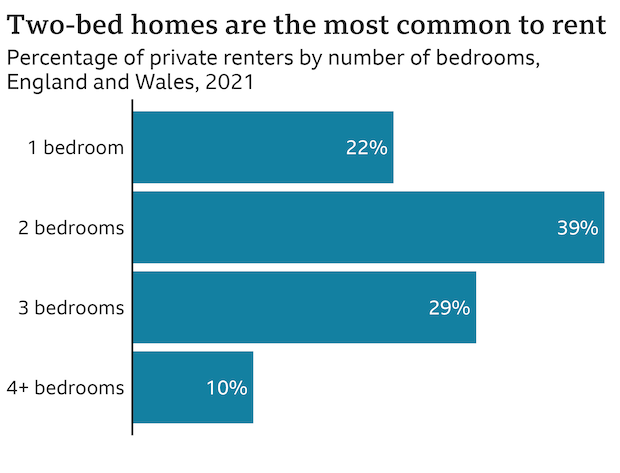
The National Housing Federation (NHF) said the number of people aged over 55 who were renting privately in England had soared. Its survey of about 2,000 of these older tenants suggested that 42% of those asked regularly struggled to cover their basic living costs such as buying food and clothes or heating their homes. Rona Topaz, a 58-year-old singing teacher, said she was trying to support herself by taking on more work to cover a rising rent bill. Having suffered a number of strokes, she told the BBC she was finding it difficult to cover the rent at her bedsit.


 Enfield Labour welcomes new court order to stop antisocial behaviour in Edmonton Green
Enfield Labour welcomes new court order to stop antisocial behaviour in Edmonton Green David Lammy arrives in Downing Street after becoming deputy prime minister
David Lammy arrives in Downing Street after becoming deputy prime minister CTCA UK Condemns the Political Forcing Out of Afzal Khan MP for Engaging with Turkish Cypriots
CTCA UK Condemns the Political Forcing Out of Afzal Khan MP for Engaging with Turkish Cypriots Tatar: “Reaction to MP’s TRNC visit is yet another stark example of the Greek Cypriot leadership’s primitive and domineering mentality”
Tatar: “Reaction to MP’s TRNC visit is yet another stark example of the Greek Cypriot leadership’s primitive and domineering mentality” 102nd Anniversary Celebration Ball of the Republic of Türkiye in London
102nd Anniversary Celebration Ball of the Republic of Türkiye in London Latest! Israeli navy intercepts Global Sumud Flotilla as it approaches Gaza to break siege
Latest! Israeli navy intercepts Global Sumud Flotilla as it approaches Gaza to break siege Enfield Labour Calls for Public Feedback on Crime and Safety Concerns
Enfield Labour Calls for Public Feedback on Crime and Safety Concerns Important Travel Updates: London Underground and DLR Strike Action
Important Travel Updates: London Underground and DLR Strike Action Champions League, Liverpool lose at Galatasaray
Champions League, Liverpool lose at Galatasaray Liverpool flew out for their Champions League match against Galatasaray
Liverpool flew out for their Champions League match against Galatasaray Enfield Council has approved plans for Surf London
Enfield Council has approved plans for Surf London Zlatan Ibrahimović receives UEFA President’s Award
Zlatan Ibrahimović receives UEFA President’s Award Maritime Finance and Sustainability Take Centre Stage at LISW25 Gala Dinner
Maritime Finance and Sustainability Take Centre Stage at LISW25 Gala Dinner London welcomes traders back to the reopened Seven Sisters Market
London welcomes traders back to the reopened Seven Sisters Market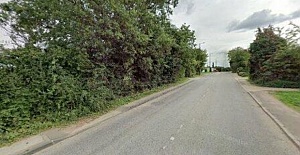 Enfield’s Crews Hill and Chase Park shortlisted for potential New Town
Enfield’s Crews Hill and Chase Park shortlisted for potential New Town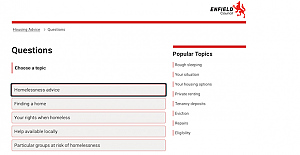 Important milestone achieved with no hotel placements for temporary accommodation
Important milestone achieved with no hotel placements for temporary accommodation





